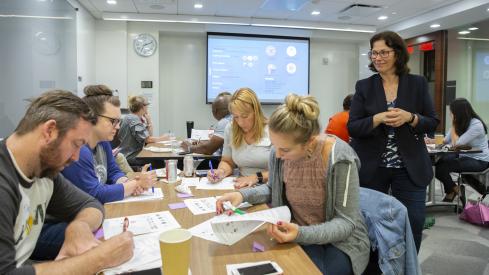
“MƒA allows us to engage with others to learn new strategies and try them out in safe spaces before bringing them back to the classroom.”
ALL-ED stands for All Learners Learning Every Day...that's the goal, right? Finding sustainable ways to respond to student diversity on a daily basis is among teachers’ greatest challenges. In our 2018 fall semester mini-course “ALL-ED: A Framework for Differentiation,” teachers worked on how to differentiate instruction both in planning and in practice, addressing problems such as variations in students' need for review, missing basic skills, confusions, absences, early finishers, and literacy levels. The ALL-ED framework brought together practical, sustainable, research-based routines enabling teachers to effectively tailor instruction to meet the learning needs of all students.

Led by Rhonda Bondie, Ph.D., who teaches at Harvard Graduate School of Education and has over 20 years of experience as a teacher and administrator in public schools, and MƒA Master Teacher Abbie Sewall, who teaches at Metropolitan Expeditionary Learning School in Queens, sessions focused on developing differentiated instructional materials and introduced "on your feet" decision making. “We practiced routines and structures that increase equity of student access within the classroom,” said Abbie. “These tools boost clarity for students and their access to the tasks, while providing adequate rigor and relevance.”
Having facilitated with Rhonda previously, Abbie says she gains a deeper understanding of the different structures that benefit students each time she leads an MƒA course. “I learn from having conversations about classroom situations and thinking about what students need; the co-facilitation improves my own practice.”
Like many MƒA teachers, Abbie says that when she takes instructional risks, it makes an impact on her teaching. “MƒA allows us to engage with others to learn new strategies and try them out in safe spaces before bringing them back to the classroom.”